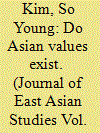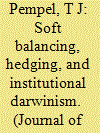| Srl | Item |
| 1 |
ID:
096600


|
|
|
|
|
| Publication |
2010.
|
| Summary/Abstract |
The Asian values debate has been long on speculative advocacy but short on empirical validation, with statistical tests emerging only lately. This study explores two questions: whether Asians indeed hold distinct cultural attitudes when compared with non-Asians and whether these cultural attitudes and beliefs identified as Asian values form coherent dimensions among Asians. The study first identifies four dimensions of Asian values based on a review of various Asian values discourses: familism, communalism, authority orientations, and work ethic. The findings from the empirical analysis based on multilevel models and factor analysis return mixed support for the Asian values hypothesis. Although East Asian respondents do exhibit strong work-related values compared with those from other regions, commitment to familial values and authoritarian orientations are actually lower among East Asians. Also, while preference for strong leadership and parental duty do turn out to form distinct sets of attitudes among South and Southeast Asians, the four dimensions do not constitute a clear value complex in the minds of East Asians.
|
|
|
|
|
|
|
|
|
|
|
|
|
|
|
|
| 2 |
ID:
096599


|
|
|
|
|
| Publication |
2010.
|
| Summary/Abstract |
Business interests are overrepresented in Hong Kong's nominally democratic political institutions. Many in Hong Kong perceive this as evidence of the existence of "collusion between government and business," a phenomenon that has stirred public concerns in the city since its sovereignty transfer. Although anecdotal accounts abound, no systematic analysis has been conducted to evaluate the validity of this perception. In this article I use a rich firm-level dataset to offer the first systematic assessment of the effects of political connections on firm performance in Hong Kong. I define politically connected firms as firms that have stakeholders concurrently holding a seat on the Election Committee, a constitutional body that elects the city's chief executive. I found evidence, though not overwhelming, consistent with the "collusion" hypothesis: political connections do improve firm performance measured by return on equity and market-to-book ratio. The improvement is unlikely due to unobserved confounding factors such as firms' inherent ability. As for the origin of the political connections, the data show that a firm's economic power has little predictive value of its connections to the Election Committee. Rather, number of employees matters; firms that hire fewer workers were more likely to gain a seat on the 1997 Election Committee. This result may suggest that Beijing plays a more dominant role in the formation of political connections-that serve Beijing's co-optation needs rather than the interests of powerful firms that may have a desire to "capture" the state.
|
|
|
|
|
|
|
|
|
|
|
|
|
|
|
|
| 3 |
ID:
096598


|
|
|
|
|
| Publication |
2010.
|
| Summary/Abstract |
East Asia has increased its formal institutional linkages in both the economic and security arenas. This article addresses three questions concerning this expansion. First, why has the number of institutions increased? Second, why is there so little overlap in the purposes and memberships of these many new bodies? Third, why have most regional institutions achieved such limited policy successes? The article demonstrates that the bulk of the new economic institutions represent collective responses to generalized pressures from globalized finance, whereas the new security bodies deal with regionally endogenous problems of a highly particularistic character. Furthermore, most regional bodies in East Asia still reflect the preeminence of individual state strategies rather than any collective predisposition toward multilateralism per se. East Asian regionalism thus represents a complex "ecosystem" of institutions whose future is likely to see the enhancement of some and the diminution of others through a process referred to here as "institutional Darwinism
|
|
|
|
|
|
|
|
|
|
|
|
|
|
|
|